-
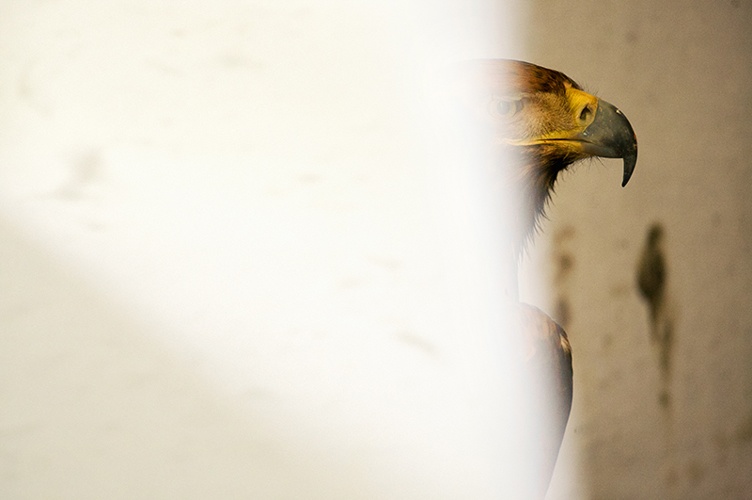 An eastern imperial eagle is peering from his cage. After he was found shot by poachers, the eagle was taken to the Rescue Center for Wild Animals in Stara Zagora. His left wing was amputated which doomed him to live his life in a cage.
An eastern imperial eagle is peering from his cage. After he was found shot by poachers, the eagle was taken to the Rescue Center for Wild Animals in Stara Zagora. His left wing was amputated which doomed him to live his life in a cage. -
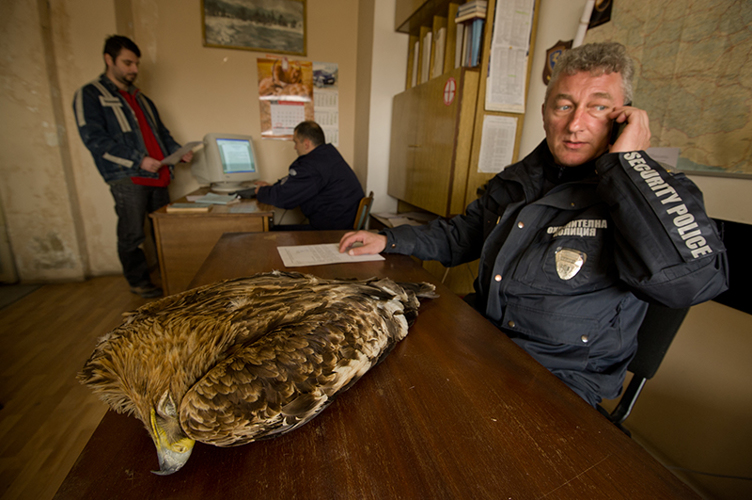 An employee of the Bulgarian Society for the Protection of Birds is giving information about a shot eastern imperial eagle at the police station in Yambol. Despite the legally prescribed strict measures, there have been no cases of people convicted for such a crime so far.
An employee of the Bulgarian Society for the Protection of Birds is giving information about a shot eastern imperial eagle at the police station in Yambol. Despite the legally prescribed strict measures, there have been no cases of people convicted for such a crime so far. -
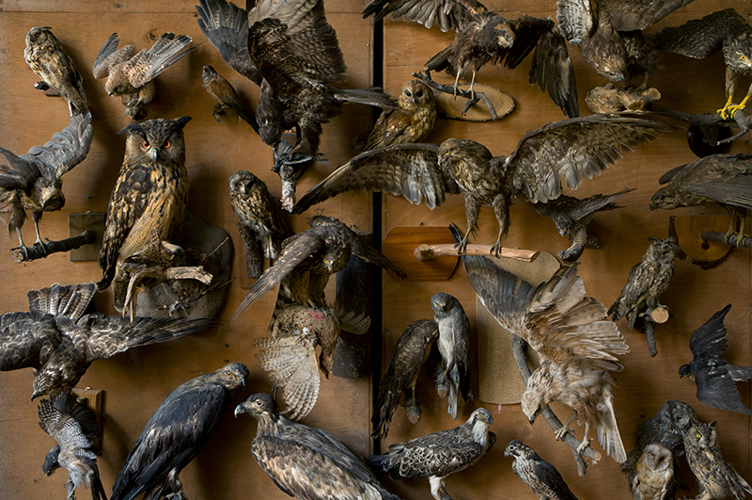 Stuffed birds (buzzards, imperial eagles, hawks, falcons and owls) confiscated from lodges and restaurants. Shooting and stuffing birds of prey in Bulgaria has long since become a tradition and is still practiced although these acts are prohibited by law.
Stuffed birds (buzzards, imperial eagles, hawks, falcons and owls) confiscated from lodges and restaurants. Shooting and stuffing birds of prey in Bulgaria has long since become a tradition and is still practiced although these acts are prohibited by law. -
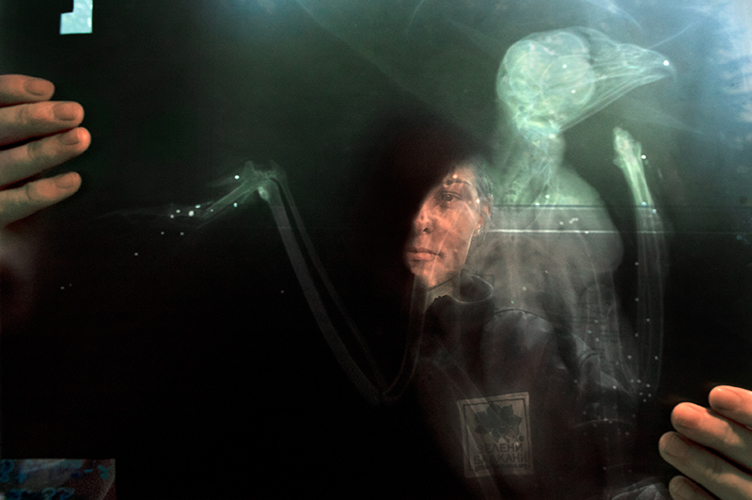 The white spots in the X-ray of this buzzard show that he was shot by poachers. In addition to rescue operations, employees of the Rescue Center for Wild Animals in Stara Zagora perform autopsies of birds to determine the cause of death. For raptors the cause is usually birdshots, electric shock (from a power line) or poisoning.
The white spots in the X-ray of this buzzard show that he was shot by poachers. In addition to rescue operations, employees of the Rescue Center for Wild Animals in Stara Zagora perform autopsies of birds to determine the cause of death. For raptors the cause is usually birdshots, electric shock (from a power line) or poisoning. -
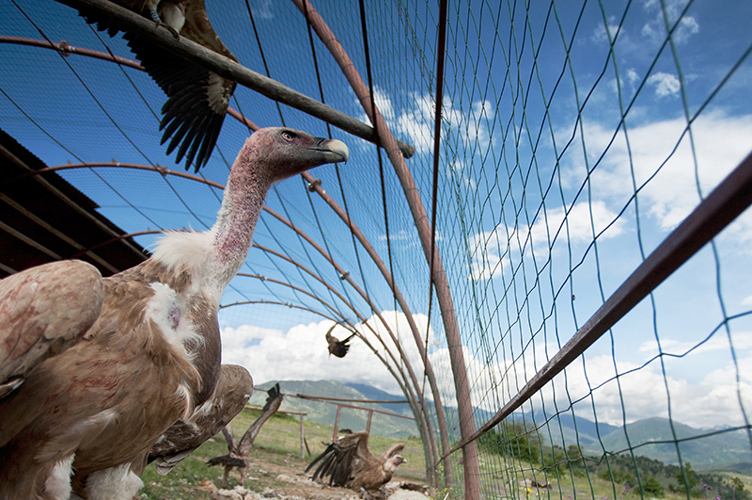 Griffon vultures, which play the role of medical orderlies of nature, were almost completely extinct in Bulgaria in the 1960s and 1970s. Today attempts are being made to return the species to our mountains and for this purpose birds are imported from Spain. After a several month stay in the aviary, the birds are set free. This process is repeated until at least several couples start nesting in this area and start reproducing.
Griffon vultures, which play the role of medical orderlies of nature, were almost completely extinct in Bulgaria in the 1960s and 1970s. Today attempts are being made to return the species to our mountains and for this purpose birds are imported from Spain. After a several month stay in the aviary, the birds are set free. This process is repeated until at least several couples start nesting in this area and start reproducing. -
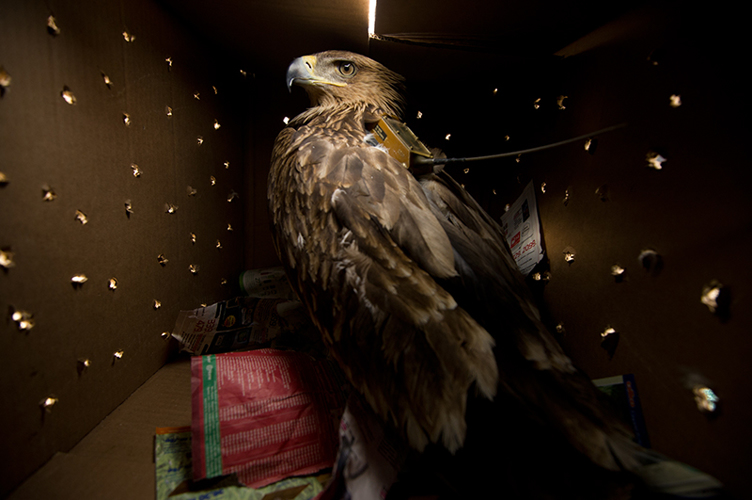 This eastern imperial eagle wounded by poachers was nursed back to health in the Green Balkans Wild Rescue Center and is expecting his release. Drugged rare birds are sometimes transported and illegally exported across the border in similar cardboard boxes with slits for air.
This eastern imperial eagle wounded by poachers was nursed back to health in the Green Balkans Wild Rescue Center and is expecting his release. Drugged rare birds are sometimes transported and illegally exported across the border in similar cardboard boxes with slits for air. -
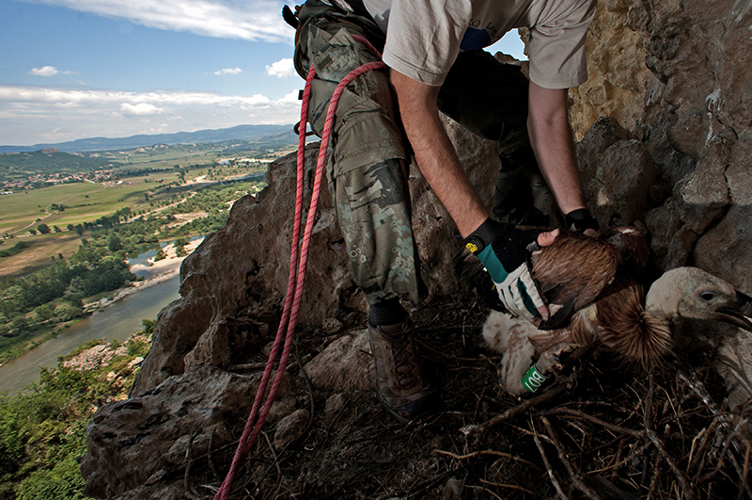 Experts on the protection of endangered species use different methods to monitor populations. In this case, a numbered ring is being put on a griffon vulture which helps to track migrations of the bird.
Experts on the protection of endangered species use different methods to monitor populations. In this case, a numbered ring is being put on a griffon vulture which helps to track migrations of the bird. -
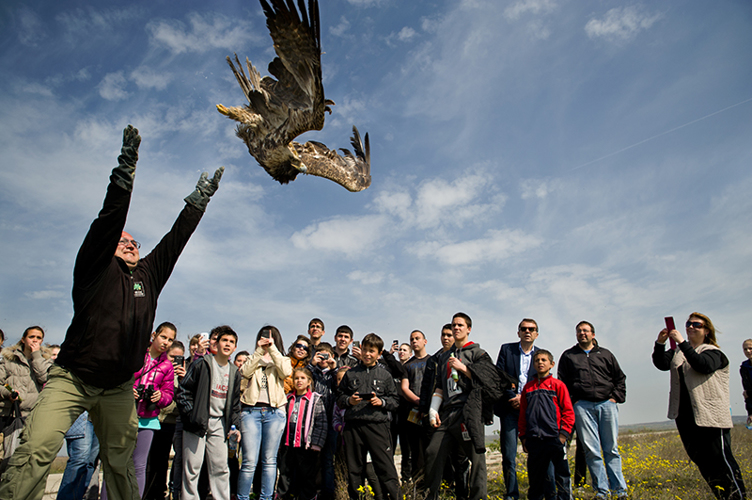 A team of Green Balkans is releasing an imperial eagle nursed back to health. To attract attention to their cause, the conservationists invite local people, students and media representatives to be present at the release of birds.
A team of Green Balkans is releasing an imperial eagle nursed back to health. To attract attention to their cause, the conservationists invite local people, students and media representatives to be present at the release of birds.
In danger of extinction
In 1960s there was a massive campaign for killing raptors in Bulgaria. Durring this period the population of the bearded vulture was wiped out and many other species were pushed to the brink of extinction. Two decades later, the saker falcon stopped its reproduction under the pressure of poachers. Today, though protected by the Bulgarian Biological Diversity Act, raptors don’t enjoy a peaceful life. From widespread species at the early 20th century, today the eastern imperial eagle and the Egyptian vulture have turned into critically endangered species in the Red List of the International Union for Conservation of Nature (UICN). In the last 30 years nature conservationists have been working hard to save endangered eagles, vultures and owls but this is not an easy task. Human activity is in an increasingly deeper conflict with nature. Destroying natural habitats, poaching, electric power lines, wind turbines, chemicals used in agriculture and illegal trade in birds are only some of the threats for raptors in Bulgaria.
Ivo Danchev was born in Sofia in 1979. Since 2009 he has been working as a freelance photographer and since 2012 as art director of the Bulgarian edition of National Geographic magazine. In July 2014 his reportage “The Death of Heroic Birds” was selected as the best local material by the main office in Washington. Ivo won the grand prize of the Lumix Awards Bulgaria competition in 2008 and the special prize for a photo essay of 2011 BG Press Photo competition. In 2012 he was winner of the Chernorizets Hrabar award.
